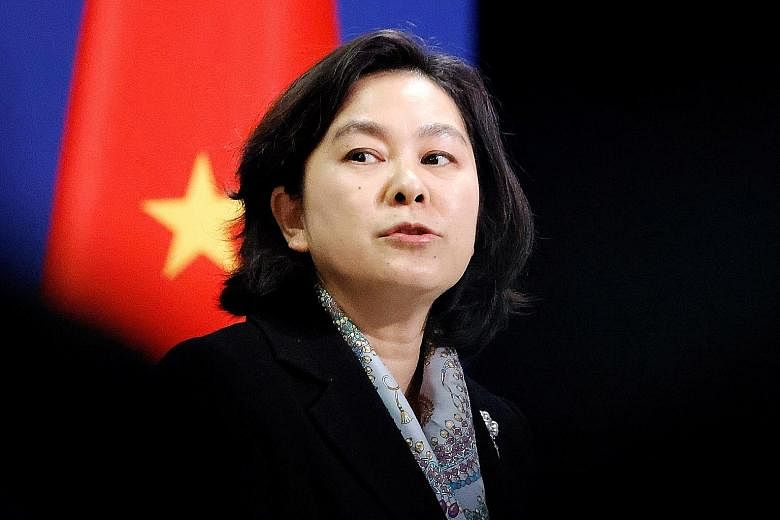BEIJING • Australian Prime Minister Scott Morrison demanded that Beijing apologise for a provocative tweet depicting one of his country's troops holding a bloody knife to an Afghan child's throat.
Instead, the Chinese Foreign Ministry's top spokesman Hua Chunying shot back, asking whether Mr Morrison lacks "a sense of right and wrong".
The response was a hit in China, where Ms Hua drew praise on social media for exuding the "style of a great power". Her deputy, Mr Zhao Lijian, was similarly cheered on for pinning the offending tweet to the top of his Twitter feed.
China's state media complex piled in, promoting stories about the ministry's remarks while the Xinhua News Agency dismissed Mr Morrison's demand as "utterly absurd" and the Global Times newspaper published an editorial describing Australia as "evil".
The episode illustrates how China's diplomatic rhetoric is increasingly driven by concerns at home, where President Xi Jinping's promise of national rejuvenation and a torrent of overseas criticism led by the Trump administration are fanning nationalistic sentiments.
China's diplomats, who reportedly once received calcium tablets from citizens hoping they grow some backbone, are recasting themselves as one of the Communist Party's most vocal defenders.
Diplomats such as Mr Zhao and Mr Liu Xiaoming, the country's ambassador to Britain, have become celebrities on China's Internet and are widely known as "Wolf Warriors" in a nod to a Rambo-like action film series. The trend points to more messy disputes such as the ones with Australia and Canada, and raises questions about China's ability to build soft power to match its economic and military might.
"I do think this strategy is more about pleasing the domestic audience," said communications professor Fang Kecheng from the Chinese University of Hong Kong.
"It is not working in terms of building China's image globally. It is working in terms of inciting nationalistic sentiment domestically. It is not working persuading the more liberal-minded Chinese. It is working in terms of answering the call from the top leadership - and the last thing is what they really care about."
The shift is just one way that United States President-elect Joe Biden's administration is facing a diplomatic landscape that has grown more combative after four years of Mr Donald Trump's Twitter-driven approach.
Besides dismissing the complaints of world leaders such as Mr Morrison or Canadian Prime Minister Justin Trudeau, China's foreign ministry has regularly denounced top US officials such as Secretary of State Mike Pompeo as "evil" and "liars".
China's diplomats enjoy a captive audience in a tightly censored media environment where Twitter and Facebook are banned. The foreign ministry has used its state-controlled platforms to counter overseas criticism by highlighting what they describe as Western hypocrisy on issues like trade, security and human rights, appealing to the party's narrative that it ended a "century of humiliation" by colonial powers.
The ministry's spokesmen regularly swing from calling out other countries' human rights records to rigorously defending China's. Allegations of abuses against Muslims in Xinjiang - including genocide claims - are countered, for example, by highlighting the US' treatment of Native Americans.
Australian allies including New Zealand and Britain joined Canberra in condemning the tweet. The US National Security Council also issued a tweet saying that Australian wine will be featured at a White House holiday reception this week.
On Tuesday, Mr Morrison signalled a desire to avoid escalation in remarks to lawmakers, the Australian Associated Press reported, saying he did not want "further amplification" of the matter. He also made his own direct appeal to Chinese citizens by posting a message on WeChat defending his "free, democratic, liberal country".
"The post of a false image of an Australian soldier does not diminish our respect for and appreciation of our Chinese-Australian community or indeed our friendship with the people of China," he said.
Ms Natasha Kassam, a former Australian diplomat in China who is now a research fellow at the Sydney-based Lowy Institute, said: "The logic of Xi Jinping's China, where low-level officials are performing loyalty tests back to the centre, means there's very little chance to admit something has gone wrong."
BLOOMBERG

